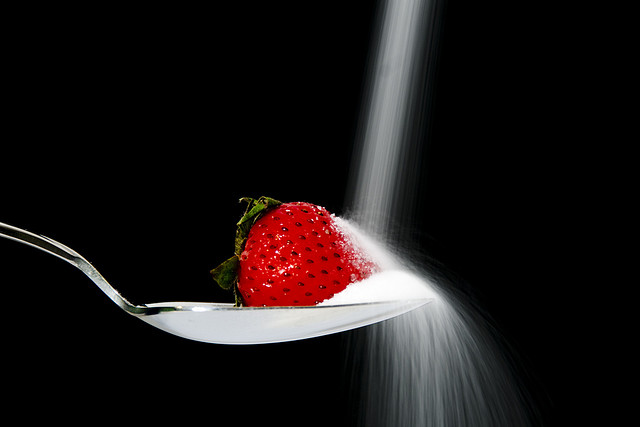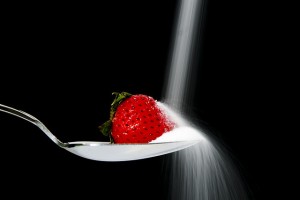
 There’s been debate for years over the good and bad of sugar. Whatever side of the fence you’re on, there’s no denying that in today’s society, we’re eating more and more and more of it. Whether it’s sugar, corn syrup, fructose, high fructose corn syrup, or other forms, it’s all sugar, and today it’s not just in desserts and sweets, but in soups, condiments, yogurts, cereals, granola bars, breads, canned goods, and more, say nothing of all the sweetened sodas and other drinks. We only need look at our expanding waistlines to see how it’s hurting us.
There’s been debate for years over the good and bad of sugar. Whatever side of the fence you’re on, there’s no denying that in today’s society, we’re eating more and more and more of it. Whether it’s sugar, corn syrup, fructose, high fructose corn syrup, or other forms, it’s all sugar, and today it’s not just in desserts and sweets, but in soups, condiments, yogurts, cereals, granola bars, breads, canned goods, and more, say nothing of all the sweetened sodas and other drinks. We only need look at our expanding waistlines to see how it’s hurting us.
Sugar is Addictive
Jeff O’Connell, editor-in-chief of Bodybuilding.com and the author of Sugar Nation, wrote a guest blog for Kris Carr, author of Crazy, Sexy Diet. In it, he claims that sugar is an addictive substance that “speeds along the same brain pathways as heroin.” Scientific evidence backs his assertion. In 2002 Princeton University psychologists found that such a thing as sugar dependency really exists, and that rats that binged on sugar later exhibited signs of withdrawal.
Neuroscientist Bart Hoebel noted sugar triggers production of the brain’s natural opioids. “We think that is a key to the addiction process,” he said. “The brain is getting addicted to its own opioids as it would to morphine or heroin.” In a later study published in 2008, Hoebel found that after the rats were denied sugar, they worked even harder to get it when it was reintroduced, and ate more than ever before. Hoebel claims this shows that the bingeing behavior forged actual changes in brain function. He also noted that dopamine was released in the brain when the rats drank a sugar solution-a chemical thought to trigger motivation and eventually, addiction.
Cancer Cells Love Sugar
I first became concerned about sugar and health when I went through my first positron emission tomography (PET) scan. This is a type of scan doctors used to take pictures of the inside of the body, in my case, to detect any additional tumors or cancer growths. Before the scan, I received an injection of a radioactive glucose (type of sugar) solution. I asked the nurse about it, and learned that the glucose is taken up immediately by high-glucose-using cells such as brain, kidney, and cancer cells! The radioactive sugar solution helps “light up” the cancer so the doctors can see it on the image.
High Blood Sugar Levels Lead to Disease
Of course, the body regularly converts food into glucose to use as fuel, so this isn’t overly alarming by itself, but I just remember feeling uncomfortable with the fact that cancer cells enjoy glucose so much! I later learned that a U.S. study had found that tumor cells use glucose and fructose differently-using fructose particularly to increase cancer cell proliferation. (Can you say goodbye high fructose corn syrup? I did!)
So I started to do my research, and that’s when I realized that sugar can be addictive, that it’s in a ton of our daily foods, and that eating a lot of it tips our blood sugar levels into the danger zone, which may be part of the reason why so many people are getting diabetes these days. High blood sugar has also been linked to premature aging, the formation of damaging free radicals, kidney failure, cardiovascular disease (hardening of the arteries), stroke, a stunted production of growth hormone (which can accelerate aging), eye problems, gum disease, a higher risk of infections, and much more.
Balance Your Sugar Intake for a Healthier Life
It all comes down to balancing blood sugar levels. Today, most of us aren’t doing a very good job. Even natural foods like watermelons and dates add sugar to the blood. Imagine what all the extra sugar we consume every day is doing to our bodies?
I’m not saying you have to cut sugar completely out of your life like I have (and I feel much better!), but you will definitely experience the health benefits if you cut back. Here are some tips from Kris Carr and myself to help you do just that-just try it and see. Don’t be surprised if you experience some uncomfortable withdrawal symptoms for the first few days. That’s just your body telling you that you’re addicted, and it’s time to make a change!
- Buy organic. Check the labels, but most organic soups, condiments, applesauce, yogurts, etc. have either no sugar or much less sugar than their mainstream counterparts. You don’t need ketchup, bread, or tomato soup with high fructose corn syrup. Buy the brands that don’t have it.
- Focus on a plant-based diet. Plant-based foods naturally lower your blood sugar levels. Eat more veggies, whole grains, nuts, beans, legumes, and fruits.
- Cut out the bad stuff. White sugar, white rice, white bread, pastries, cakes, doughnuts, and all the “junk” are all chocked full of sugar with no nutrients. They spike your blood sugar levels without giving you any health benefits. Cut them out, cold turkey!
- What are you drinking? Soda, juice, and even diet drinks are full of either sugar or artificial sweeteners, which will all feed your addiction. Drink water, tea, and coffee.
- Choose healthy sweeteners. To add a bit of sweet taste to your homemade goodies, try stevia leaf, brown rice syrup, agave syrup or maple syrup in small amounts.
- Plan ahead. If you don’t have something handy to snack on, you’ll fall back on your old habits. Stack your cupboards with healthy snacks like nuts, cut-up fruits and veggies, whole grain crackers and cheese, and the like. Your taste buds will adapt more quickly than you expect!
Do you have tips for cutting back on sugar? Let us know.
Sources
“Sugar on the Brain: Study Shows Sugar Dependence in Rats,” News from Princeton University, June 20, 2002. http://www.princeton.edu/pr/news/02/q2/0620-hoebel.htm.
Princeton University. “Sugar Can Be Addictive: Animal Studies Show Sugar Dependence.” ScienceDaily, 10 Dec. 2008. Web. 29 Nov. 2011.
Maggie Fox, “Cancer Cells Slurp Up Fructose, US Study Finds,” Reuters August 2, 2010. http://www.reuters.com/article/2010/08/02/cancer-fructose-idAFN0210830520100802.
Photo courtesy TarHeel in NJ via Flickr.com.

